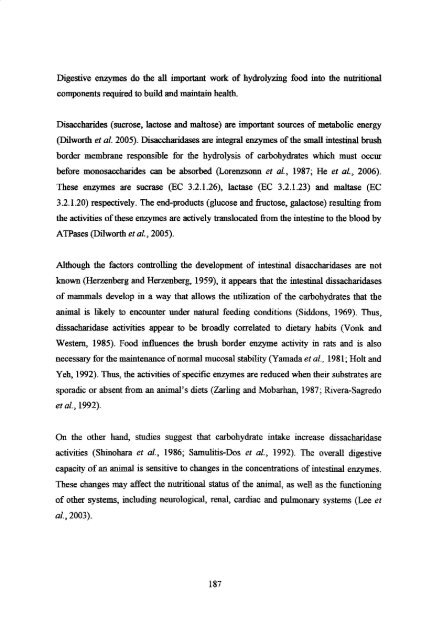ANTI-NUTRITIONAL CONSTITUENT OF COLOCASIA ESCULENTA ...
ANTI-NUTRITIONAL CONSTITUENT OF COLOCASIA ESCULENTA ...
ANTI-NUTRITIONAL CONSTITUENT OF COLOCASIA ESCULENTA ...
Create successful ePaper yourself
Turn your PDF publications into a flip-book with our unique Google optimized e-Paper software.
Digestive enzymes do the all important work of hydrolyzing food into the nutritional<br />
components required to build and maintain health.<br />
Disaccharides (sucrose, lactose and maltose) are important sources of metabolic energy<br />
(Dilworth et al. 2005). Disaccharidases are integral enzymes ofthe small intestinal brush<br />
border membrane responsible for the hydrolysis of carbohydrates which must occur<br />
before monosaccharides can be absorbed (Lorenzsonn et al., 1987; Re et aI., 2006).<br />
These enzymes are sucrase (BC 3.2.1.26), lactase (BC 3.2.1.23) and maltase (BC<br />
3.2.1.20) respectively. The end-products (glucose and fructose, galactose) resulting from<br />
the activities ofthese enzymes are actively translocated from the intestine to the blood by<br />
ATPases (Dilworth et al., 2005).<br />
Although the factors controlling the development of intestinal disaccharidases are not<br />
known (HeIZenberg and Rerzenberg, 1959), it appears that the intestinal dissacharidases<br />
of mammals develop in a way that allows the utilization of the carbohydrates that the<br />
animal is likely to encounter under natural feeding conditions (Siddons, 1969). Thns,<br />
dissacharidase activities appear to be broadly correlated to dietary habits (Vonk and<br />
Western, 1985). Food influences the brush border enzyme activity in rats and is also<br />
necessary for the maintenance ofnormal mucosal stability (Yamada et al., 1981; Rolt and<br />
Yeh, 1992). Thus, the activities ofspecific enzymes are reduced when their substrates are<br />
sporadic or absent from an animal's diets (Zarling and Mobarhan, 1987; Rivera-Sagredo<br />
et aI., 1992).<br />
On the other hand, studies suggest that carbohydrate intake increase dissacharidase<br />
activities (Shinohara et al., 1986; Samulitis-Dos et aI., 1992). The overall digestive<br />
capacity ofan animal is sensitive to changes in the concentrations of intestinal enzymes.<br />
These changes may affect the nutritional status of the animal, as well as the functioning<br />
of other systems, including neurological, renal, cardiac and pulmonary systems (Lee et<br />
al.,2003).<br />
187
















